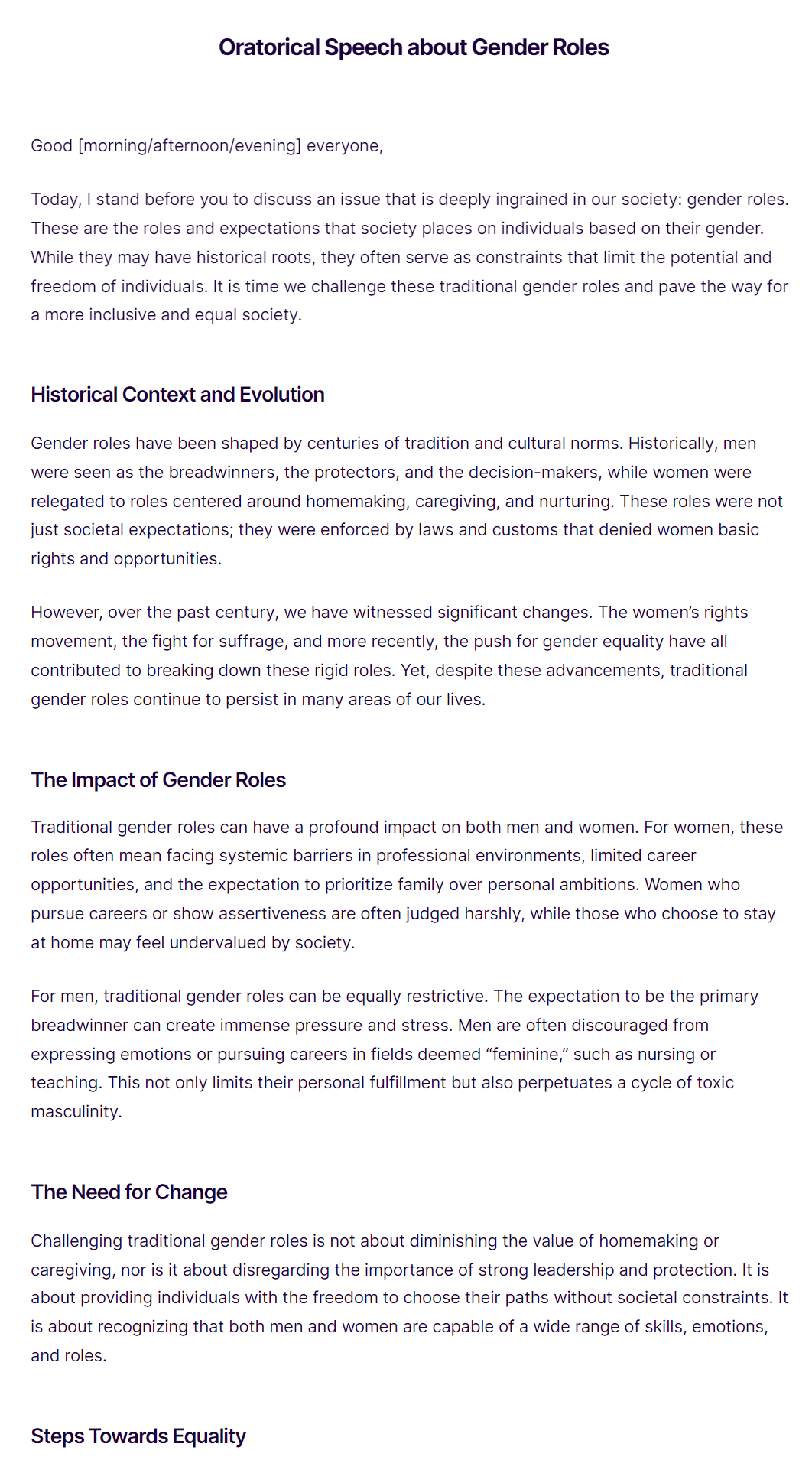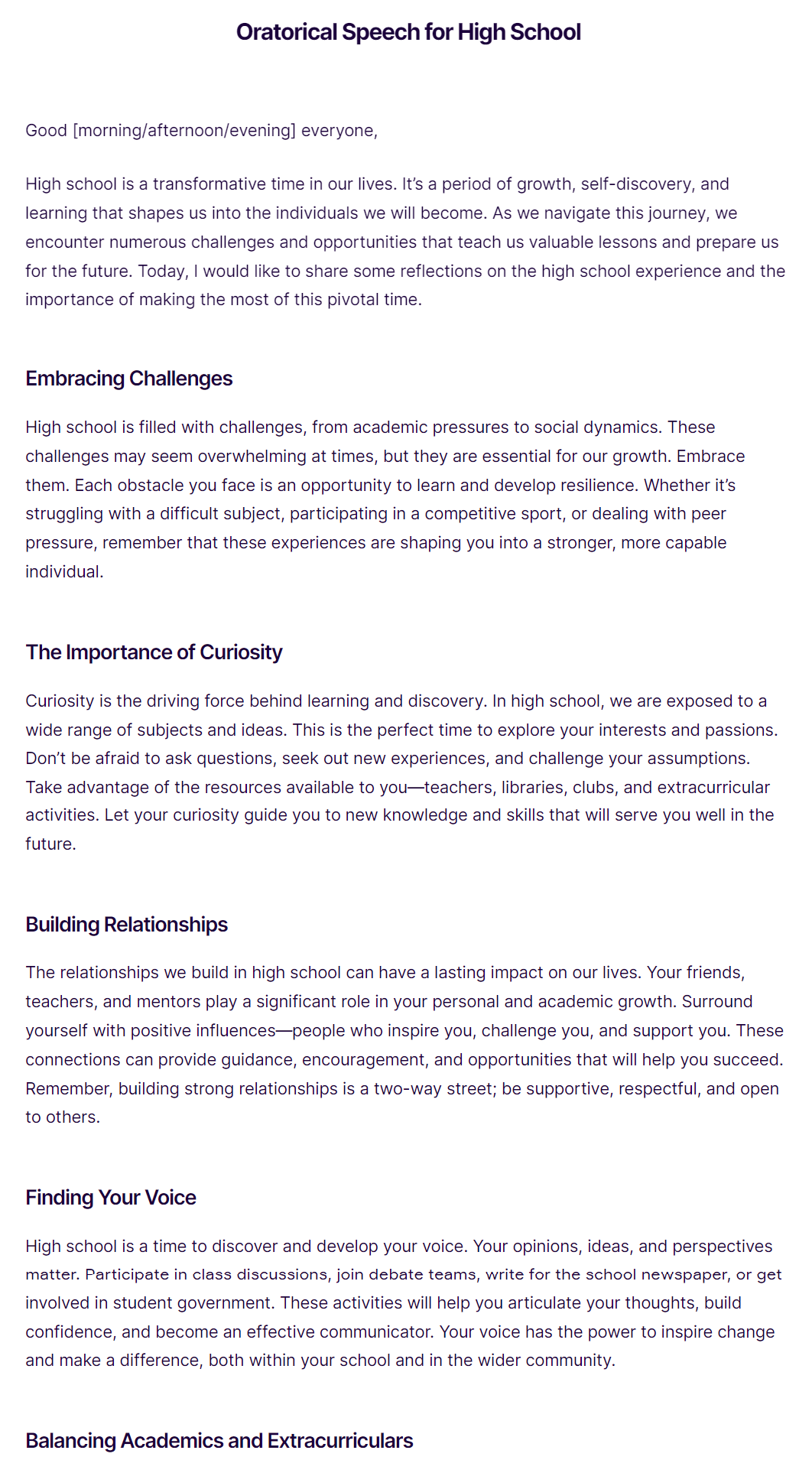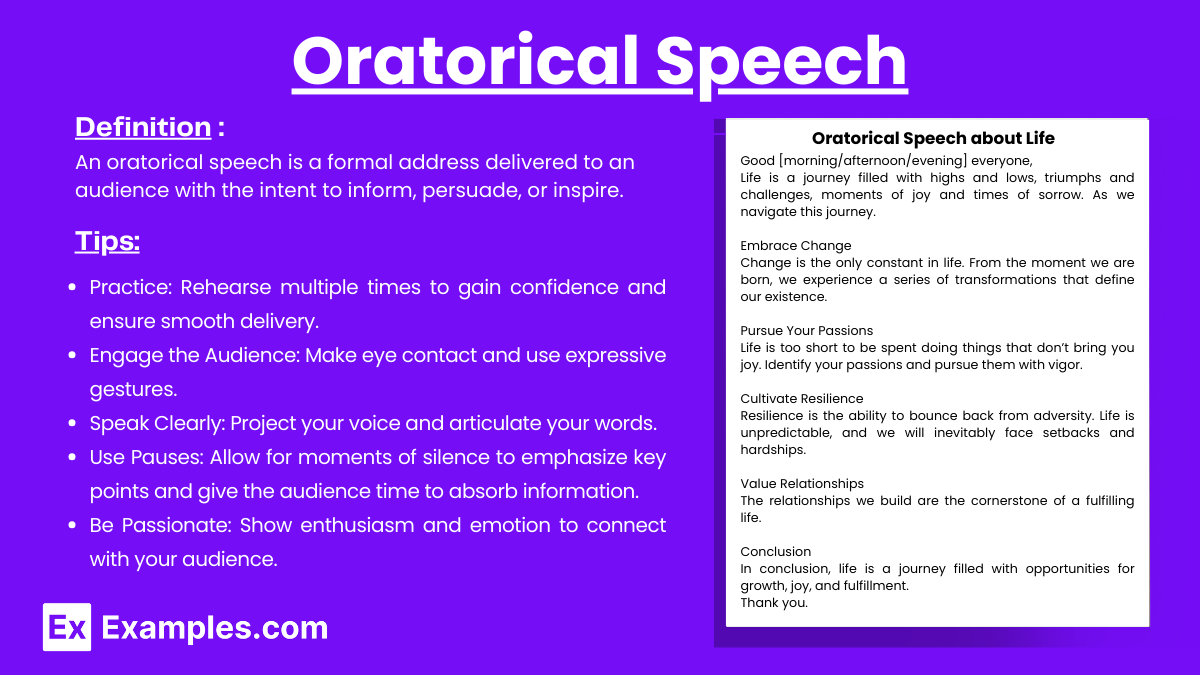32+ Oratorical Speech Examples
An Oratorical Speech is a formal address delivered to an audience with the intent to inform, persuade, or inspire. It often features eloquent language, structured arguments, and expressive delivery to effectively communicate the speaker’s message. This type of speech is commonly associated with public speaking events, debates, and ceremonial occasions, where the speaker aims to engage and captivate the audience through powerful rhetoric and presentation skills.

Oratorical Speech Bundle Download
What is Oratorical Speech?
Oratorical Speech Format
Introduction
Start with a compelling hook or quote.
Introduce the main topic or purpose.
State your thesis or main argument.
Body
Present 2-3 key points.
Provide supporting evidence, examples, or anecdotes for each point.
Use transitions to maintain a smooth flow between points.
Conclusion
Oratorical Speech Example
Short Oratorical Speech Example
Oratorical Speech about Gender Roles

Oratorical Speech for High School

Oratorical Speech about Life

More Oratorical Speech Topics
- Oratorical Speech for Students
- Oratorical Speech for Elementary
- Oratorical Speech about Education
- Oratorical Speech about Human Rights
- Oratorical Speech about Freedom of Speech
- Oratorical Speech about Technology and Society
- Oratorical Speech about Cultural Diversity
- Oratorical Speech about Youth Empowerment
- Oratorical Speech about Climate Change
- Oratorical Speech about Life Challenges
- Oratorical Speech about Democracy
- Oratorical Speech about Animal Rights
- Oratorical Speech about Love
- Oratorical Speech about Reading
- Oratorical Speech about Economic Inequality
- Oratorical Speech about Environmental Conservation
- Oratorical Speech about Digital Privacy
- Oratorical Speech about Globalization
- Oratorical Speech about Ethical Leadership
- Oratorical Speech about Public Health
- Oratorical Speech about Immigration Policies
- Oratorical Speech about Artificial Intelligence
- Oratorical Speech about Racial Equality
- Oratorical Speech about Freedom of Religion
- Oratorical Speech about Media Influence
- Oratorical Speech about Political Corruption
- Oratorical Speech about Space Exploration
How to Write Oratorical Speech
1. Choose a Topic
Select a meaningful and engaging topic.
Ensure it’s something you are passionate about.
2. Outline the Structure
Introduction: Start with a hook, introduce the topic, and state your thesis.
Body: Present 2-3 key points with supporting evidence and examples.
Conclusion: Summarize main points, restate the thesis, and end with a strong closing statement.
3. Write the Draft
Use clear and eloquent language.
Include persuasive elements and rhetorical devices.
Ensure each section transitions smoothly.
4. Edit and Revise
Check for clarity, coherence, and impact.
Remove any redundant or weak points.
Practice delivering it aloud to refine flow and timing.
5. Finalize
Ensure it fits within the allotted time.
Make any final adjustments for maximum engagement and impact.
Tips to Deliver Oratorical Speech
- Practice: Rehearse multiple times to gain confidence and ensure smooth delivery.
- Engage the Audience: Make eye contact and use expressive gestures.
- Speak Clearly: Project your voice and articulate your words.
- Use Pauses: Allow for moments of silence to emphasize key points and give the audience time to absorb information.
- Be Passionate: Show enthusiasm and emotion to connect with your audience.
- Control Pace: Maintain a steady pace, not too fast or too slow.
- Use Notes Sparingly: Have an outline handy, but avoid reading directly from it.
- Stay Composed: Take deep breaths if you feel nervous and stay focused on your message.
- Connect Personally: Share personal anecdotes or stories to make your speech relatable.
- End Strong: Conclude with a memorable and impactful statement.
Who can give an oratorical speech?
Anyone with a message to convey can give an oratorical speech, including students, professionals, politicians, and activists.
How do you start an oratorical speech?
Start with a compelling hook, such as a quote, question, or anecdote, to grab the audience’s attention.
What are the key elements of an oratorical speech?
Key elements include a clear purpose, engaging introduction, structured body, strong conclusion, and effective delivery.
How do you choose a topic for an oratorical speech?
Choose a topic that you are passionate about and that resonates with your audience’s interests and concerns.
What techniques improve oratorical speech delivery?
Use techniques like proper pacing, pauses, vocal variety, body language, and eye contact to enhance delivery.
How important is audience analysis in oratorical speech?
Audience analysis is crucial to tailor your message, tone, and examples to their interests, knowledge, and attitudes.
How do you structure an oratorical speech?
Structure it with an introduction, main points organized logically in the body, and a powerful conclusion.
What role does rhetoric play in an oratorical speech?
Rhetoric enhances persuasion and impact through the use of ethos, pathos, and logos.
How do you overcome stage fright in oratorical speaking?
Overcome stage fright by practicing thoroughly, visualizing success, and using relaxation techniques like deep breathing.
What are common mistakes in oratorical speeches?
Common mistakes include lack of preparation, monotone delivery, poor body language, and failure to engage the audience.



